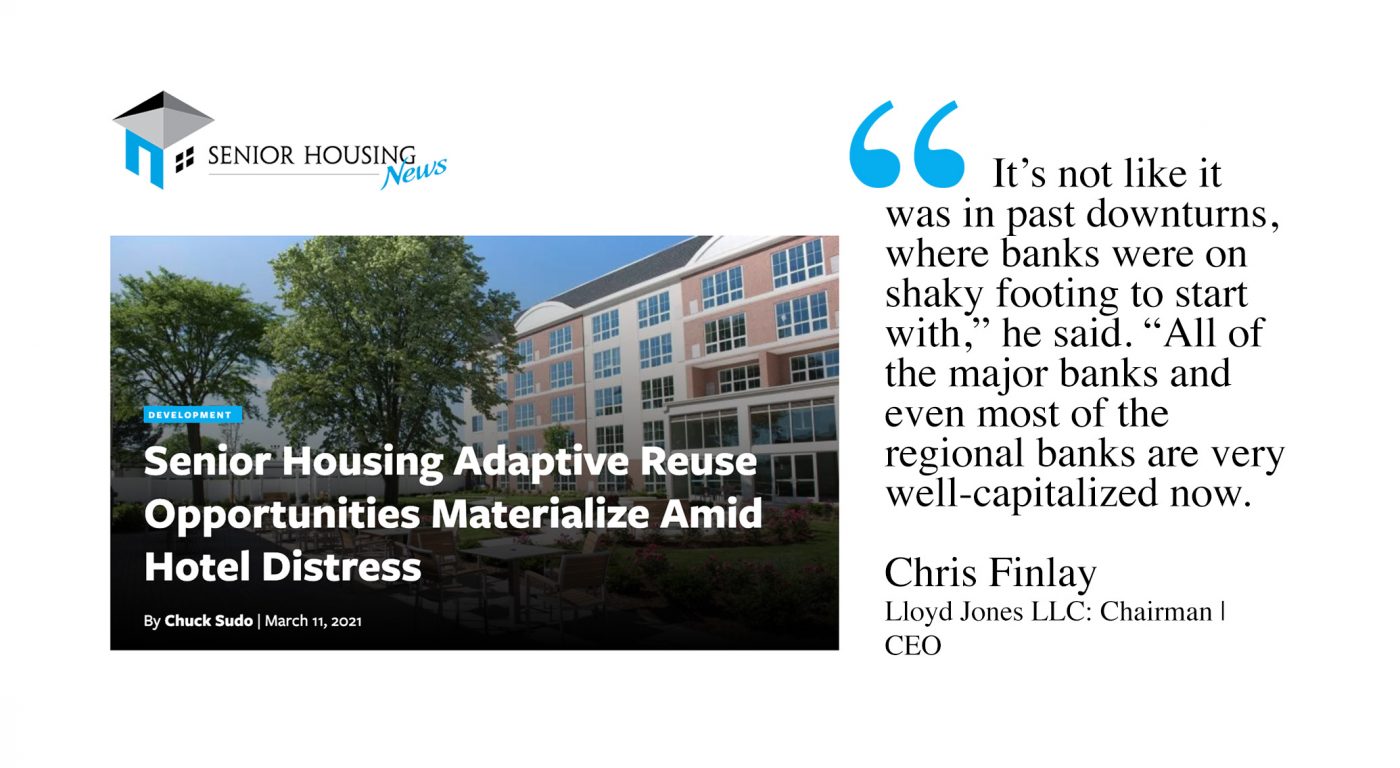Covid-19 has disrupted commercial real estate for the past year, but few asset classes have been hit as hard as the hospitality industry. From the early days of the pandemic, some senior living developers, investors and operators have said they anticipate opportunities to acquire and reposition hotel assets.
Although the availability of Covid-19 vaccines is raising hopes for a rebound in travel and tourism, when hotel business rebounds is a question no one has an answer for; some analysts expect a recovery to be similar to the “elongated recovery” predicted for senior living.
The uncertainty of a rebound in hospitality is leading some owners to weigh their options for redevelopment opportunities including senior housing. In Farmington Hills, Michigan, the owner of the Holiday Inn & Suites Farmington Hills – NW Detroit announced that it is repositioning the hotel into independent living after being shut down for nearly a year.
And in Bloomington, the owners and management of the Crowne Plaza Aire Hotel are preaching patience in a recovery before weighing redevelopment options which could include senior housing.
Senior living investors and developers are watching the distress in hotels with keen eyes. But due diligence will be essential, lest stakeholders rushing to reposition assets dig deeper holes, Canopy Lifestyles Partner and Chief Development Officer Dennis Stamey told Senior Housing News. The Marietta, Georgia-based company manages senior housing properties, and provides expertise for its clients on a range of issues, including repositionings.
“Someone really has to have an appetite for this,” he said. “They have to understand the timing that’s going to be required.”
Signs of distress emerge
A year into the pandemic, there are signs of distress in the hotel industry that could accelerate — especially if the vaccination effort does not build confidence that business and vacation travel will rebound quickly.
Among the emerging signs of distress: The owners of 43 hotels in the New York City metropolitan area were delinquent on a cumulative $1.5 billion in bonds as of October 2020. Lodging tax revenue for hotels in Bloomington, Minnesota, plummeted 33% in 2020, and are expected to remain below pre-pandemic levels this year.
Hotels across the country are laying off massive numbers of workers. Last week, the Four Seasons Silicon Valley in East Palo Alto, California permanently laid off 119 employees, San Francisco Business Times reported.
The pressure is building, as hotels require travel to generate revenues, which in turn allows owners to service the debt on their properties. Investors in commercial mortgage-backed securities (CMBS) loans backed by hotels are poised to see losses on their investments if hotels in a post-pandemic environment experience an elongated recovery.
Covid-19 is impacting luxury, full-service hotels especially hard. New York City’s legendary Roosevelt Hotel shut down last October. The owner of Chicago’s iconic Palmer House Hilton, the second-largest hotel in the city, is facing a foreclosure lawsuit claiming the firm defaulted on a $333.2 million mortgage.
Research from business management consultancy McKinsey suggests that a hotel recovery to pre-pandemic levels will not occur until 2023, if not later. Real estate investment trusts (REITs) specializing in hotels and hospitality are expected to underperform until business and vacation travel rebounds, which will not happen until vaccination efforts gain significant momentum.
So far, lenders have exercised patience with hotel owners, understanding the extreme circumstances that have befallen everyone, Lloyd Jones Capital Chairman and CEO Chris Finlay told SHN. Lloyd Jones is expanding in the senior living space with its Aviva brand, and Finlay is bullish on the opportunity to acquire and convert hotel — but, he notes that a wave of bank foreclosures is not likely in the near term.
Bank lenders have ample liquidity on their balance sheets, as a result of the Federal Reserve’s efforts to tighten lending regulations well in the years prior to the pandemic.
When the first wave of Covid-19 cases swept across the country last year, lenders were quick to retreat to the sidelines and let the market settle before gradually returning to the space. But tighter loan underwriting remains in place, along with an imbalance between the debt and equity markets — bridge debt, in particular, is hard to close. And most banks are only servicing existing clients with proven track records of success.
Finlay credits this to the Fed’s proactive efforts to shield the economy from extreme distress during the pandemic’s early weeks. It has signaled to banks that it will support them through Covid-19’s end, and will not suddenly change course.
“It’s not like it was in past downturns, where banks were on shaky footing to start with,” he said. “All of the major banks and even most of the regional banks are very well-capitalized now.”
CMBS markets have been relatively patient, as well, but ratings agencies are maintaining a close watch for any signs of loans turning over to special servicers, which would mainly impact the futures of full-service hotels such as the Palmer House. But there is volatility: the delinquency rate among hotels with CMBS loans last September was a record 33.5%, compared to just 2.5% in April 2020, according to data from real estate research firm Trepp, reported by the law firm Levenfield Pearlstein.
What happens to hotels with delinquent CMBS debt will depend on several factors including legal options on the part of owners, the patience of lenders, and the pace of recovery. Smaller hotels saddled with CMBS loans may become solid repositioning opportunities, if distress gains momentum.
“The question [for CMBS servicers] is, how aggressive do they want to be?” Finlay said. “If the hotel is closed, there is not much for them to do. They have to start the process.”
Click link for full story: https://seniorhousingnews.com/2021/03/11/senior-housing-adaptive-reuse-opportunities-materialize-amid-hotel-distress/
